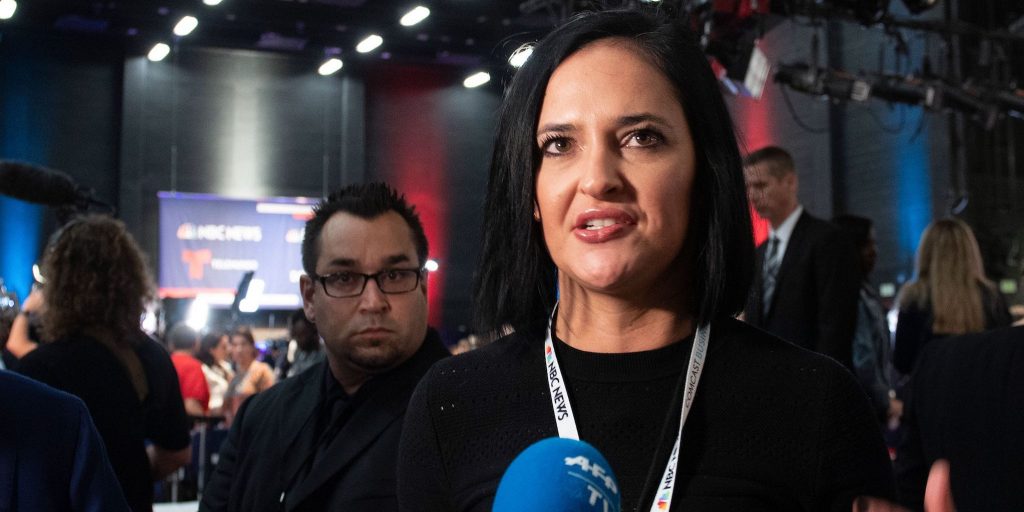- Lis Smith spoke to Insider about her new book, "Any Given Tuesday."
- Smith earned plaudits in the 2020 campaign for her work as Pete Buttigieg's communications advisor.
- The book gives an unvarnished behind-the-scenes look at campaign strategy and press relations.
Over a tumultuous two decades in politics, Lis Smith has seen a thing or two.
She's taken gambles on underdogs like Transportation Secretary Pete Buttigieg, advised establishment stalwarts such as former Virginia Gov. Terry McAuliffe and former Missouri Sen. Claire McCaskill, and mostly survived the cauldron of New York politics, working on both ends of the long-simmering feud between former New York Gov. Andrew Cuomo and former New York City Mayor Bill de Blasio.
Her new book, "Any Given Tuesday: A Political Love Story," goes behind the scenes of her time with some of the nation's most powerful Democratic lawmakers, sometimes in the midst of spiraling crises.
Well before she worked for Cuomo and then briefly rejoined as an outside advisor during the height of his sexual harassment scandal, Smith worked for his arch nemesis, de Blasio.
"I basically blacked out for the next ten minutes as he talked about everything from Fiorello La Guardia to Buddhism," she wrote of her first job interview with the future mayor.
Insider caught up with Smith on Thursday, and learned about her time with de Blasio and what she looks for in undiscovered star candidates.
This interview has been lightly edited for length and clarity.
Since a lot of your book is about relationships in politics, could you start out by telling me about the time you met Bill de Blasio when you were volunteering for the John Edwards 2004 presidential campaign in New Hampshire?
I like to call myself the Forrest Gump of politics — but in a positive way — because I feel like I have been a random witness to just so many seemingly insignificant things that then turned out to be like big historic events. I first met Bill de Blasio in December of 2003, when I was a field organizer for the Edwards campaign during a term off from Dartmouth College.
I was a field organizer for him in Keene, New Hampshire, and a bus of New Yorkers came up and the "New York for Edwards" delegation was led by none other than then-City Councilman Bill de Blasio. He stood out obviously because of his height, but he was one of those guys that was almost overly enthusiastic about knocking on doors and making phone calls, to the point that everyone else around the office sort of rolled their eyes.
My first impression was that he was a bit goofy and unserious, and never, never, ever in my wildest dreams did I think I would be sitting across the table from him 10 years later, interviewing to work for him as he was about to be the incoming mayor of New York.
Going back to when the 2020 campaign went virtual, how do you think the Biden team has handled its messaging since then? Do you think the lack of in-person events hurt them later on in building a relationship with the eventual White House press corps?
I think it forced them to up their game in terms of their digital campaigning, and they understand — I think more so than the Trump administration did — that a lot of the ways you reach people now is not just through traditional big legacy media outlets. That's why you've seen them lean on people like Olivia Rodrigo, Matthew McConaughey, the Jonas brothers. And I do think that some of that savvy did come out of innovations they had to make during the 2020 campaign.
As for their interactions with reporters, it's a good question, but if you look back on the Biden campaign's outreach during the general election, I think it actually increased his number of interactions with local press with the number of interviews he did remotely in states like Wisconsin, Pennsylvania and Michigan. But there's no doubt that there is no substitute for being in a scrum, and for having a traveling press corps with you every day, lobbing questions at you. I'm not saying that it affects him negatively, but it's an interesting question.
How do you think the decline of local news has affected campaigns?
The death of local news is a tragedy for voters and it's a tragedy for campaigns. It obviously leads to a lot less accountability for politicians. It makes it much harder for candidates to get their message out, and it puts a premium on money versus having the best policy prescriptions, or being the best campaigner. Retail politics matters much less if there are no local papers or local TV stations to go out and capture you on the campaign trail.
What the decline of local media means is that the way that voters will get their information about candidates will come increasingly from paid media, from mail pieces and TV ads, and we all know that is not where you get the full truth. And it makes it especially difficult for challengers. If you are not someone who is an established name, it's really hard to break through.
You've talked a bit about identifying talent, particularly candidates who might get overlooked, like a Pete Buttigieg. You recently signed on with Michigan state Sen. Mallory McMorrow and Cincinnati Mayor Aftab Pureval. If you could just attend town board and county legislature meetings for a year, what are the intangible qualities you'd be looking for in scouting candidates?
This is so funny, because I was just saying to Mike Schmuhl, Pete's 2020 campaign manager and now chairman of the Indiana Democrats, that my dream project would be to take off an entire year and go to the big Democratic fundraising dinner in all 50 states. Now, I understand that sounds completely sick.
It sounds horrible!
I know, but sitting at this dinner in Indianapolis, I was completely gobsmacked by how impressive some of the speakers were that I had never heard of before in my life, that you will never read about in national publications. There are so many talented Democratic elected officials across the country. But in our party, it seems the only people we ever talk about are members of Congress and senators. I mean, for God's sake, we don't even pay that much attention to governors.
And it drives me crazy because you see the Republican Party elevating governors left and right, like Ron DeSantis or Kristi Noem. There is a huge bench of mayors, of governors, of state legislators, like Mallory McMorrow, who we should be lifting up, we should be using as spokespeople for the Democratic Party.
We should start thinking about what prominent national Democrats we can use to help raise money and help campaign for them to do things like flip the Michigan state Senate. And why that matters is because the states are where a lot of the key fights are going to play out following the Dobbs Supreme Court decision. We are at the risk for seeing abortion rights eroded in more and more states.
Now, to go back to the premise of your question, I think what we should be looking for is — I'm not breaking any news here by saying that the leadership in Washington right now is a bit on the older side — we should be elevating young candidates, elevating millennial candidates in their 30s and 40s.
We tend to think of younger politicians as either captive to the very far left or the very far right, but there is a whole crop of younger elected officials across the country that aren't on the extreme, and that can relate to the majority of voters. And those are the people that we should be elevating.

